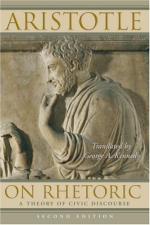
|
| Name: _________________________ | Period: ___________________ |
This quiz consists of 5 multiple choice and 5 short answer questions through Book I, Chapters 10-15.
Multiple Choice Questions
1. How did Aristotle define democracy in Book 2, Chapter 8?
(a) A representative elected by the majority.
(b) Two forms of government.
(c) Three branches of a government.
(d) The freedom of its citizens.
2. What did Aristotle say could not be considered good?
(a) Something that is dependent on something else.
(b) Something that is instrumental to something else.
(c) Something that is supplemental to something else.
(d) Something that is relied upon by something else.
3. How did Aristotle explain the binding extent of contracts?
(a) Only between two individuals or the courts and an individual.
(b) Only between two individuals.
(c) They were not binding.
(d) Only between the courts and an individual.
4. With the ethical appeal, what would the speaker be attempting to convey to the audience?
(a) Their own virtue or authority.
(b) Their own virtue or experiences.
(c) Their own experiences or authority.
(d) Their own virtue, experiences, or authority.
5. How many different subjects of political oratory did Aristotle discuss in Book I, Chapter 4?
(a) Three.
(b) Four.
(c) Five.
(d) Two.
Short Answer Questions
1. According to Aristotle, what act should the political rhetorician be concerned with?
2. In Aristotle's opinion, which things did a criminal consider when choosing their victim?
3. Who did Aristotle think must obey the general law?
4. What type of argumentation did Aristotle think the dialectic should be associated with?
5. Considering Aristotle's views in Book I, Chapter 2, how would the emotional appeal move an audience?
|
This section contains 297 words (approx. 1 page at 300 words per page) |

|




